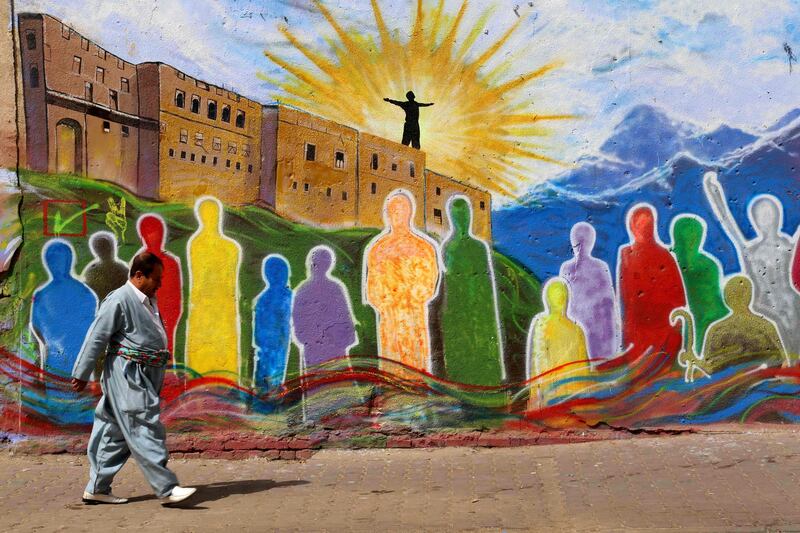Celebratory gunshots rattled the warm evening air as night fell on the Kurdish capital of Erbil, following Monday’s referendum vote. Cars raced through the narrow streets of the Christian neighbourhood of Ainkawa, blasting Kurdish music as residents braced themselves for what is expected to be a resounding “Yes.”
Voter turnout was 72% according to the Kurdish High Referendum Commission with more than three million of the more than 4.5 million eligible voters casting their ballots in a process that international observers called “free and open.” Results were not expected before 48 to 72 hours after polls closed.
But while widespread nationalistic pride has uplifted many of Iraq’s war-weary Kurds, the sense of euphoria that was carefully cultivated by President Massoud Barzani over weeks of campaigning and stirring speeches may be short-lived if no tangible changes are made.
Members of the controversial “No for Now” campaign — a Kurdish-run campaign that called for a “No” vote — are adamant that the referendum would not bring change or improve the lives of Kurds in Iraq. If anything, said one of their members, things could get worse if President Barzani refuses to step down, isolating the Kurds from the international community.
“We think that [Barzani] has used the referendum as a smokescreen to hide internal issues and as a pretext to extend his post as president without elections,” said Shaswar Abdulwahid, head of the “No for Now” campaign.
____________________
Read more:
Kurdish referendum: Excitement at polls contrasts with silence on streets
Iraq parliament demands troops be sent to Kirkuk amid Kurdish referendum
Iraqi Kurdistan independence referendum: Seven key points
____________________
Critics argue that in a landlocked, semi-autonomous region lacking the basic prerequisites for statehood, including a stable economy and a united military force,a swift and positive shift in the status quo is unlikely, even after the referendum.
“Mr. Barzani was very clear with the beginning of negotiations that it will not change overnight,” warned Bernard Kouchner, a French politician and longtime supporter of the Kurdish cause. Mr Kouchner formed part of the delegation of international observers overseeing the referendum voting.
According to Shivan Fazil, a Kurdish analyst at the American East-West Center, things are not set to change in 2017, with series of provincial elections coming up.
“Iraqi provincial elections were postponed until April, when Iraqi parliamentary elections are due. We’ve entered the election cycle in Baghdad and in November we have elections in Kurdistan,” he said. However, this string of elections is likely to maintain the flurry of populism that prevailed during the referendum campaign.
Whether this will help to increase Mr Barzani’s legitimacy in the eyes of his people remains to be seen. But just one day after the vote, Kurds remain optimistic and confident that things are set to improve.
“I believe everything will change for the better,” said voter Haani Jamil Shaboo.
Many voters in Erbil echoed a similar sense of hope and what appeared to be a collective feeling of trust in Mr Barzani, despite his shortcomings — including economic mismanagement of the Kurdish enclave and his refusal to step down from his overdue mandate.
“I think there’s a bright future for my children and they will say: I’m from Kurdistan,” said government employee Rebwar Ahmed, 62. “They’ll be proud that we achieved this independence for them.”
For some who voted "yes," nationalism overcame their initial scepticism of President Barzani. Meriwan Mohammad had a last-minute change of heart and voted “Yes” because of the external backlash against “Kurdistan’s right to an independent state.”
Change was possible if the international community decides to stop supporting Iraq, in his view. “But if the leaders stand for what we voted for, independence, then I believe the people are prepared to bare the hardship ahead,” he said.
In the disputed city of Kirkuk, 29-year-old Khogiyar Wirya is proud to have voted. “I feel very much fulfilled since I think I have carried out an important duty that we Kurds have been trying to get to for years and years,” he said. Despite his enthusiasm, he understands that change is not likely to come soon. In fact, he said, there is potential for a return to square one, with full-blown conflict over disputed territories.
“This may mean that the conflict between the two [Baghdad and Erbil] can be to the detriment of the people of Kirkuk,” said Mr Wirya, a researcher at the Middle East Research Institute in Erbil and a Kirkuki born and bred. “Baghdad can practice some temporary punitive measures to generate reactions against the Kurdistan Regional Government [KRG] and I am not sure the KRG has studied this well.”
Yet Mr Wirya has no doubt that those who cast their ballots so enthusiastically on Monday, as he did, understand the importance of what they did. “I think people understand that the process they have just embarked on can be risky. Anxiety over the near future is very much apparent among the population and I think it is now up to the political elite to inform the people about how they want to take it forward.”





